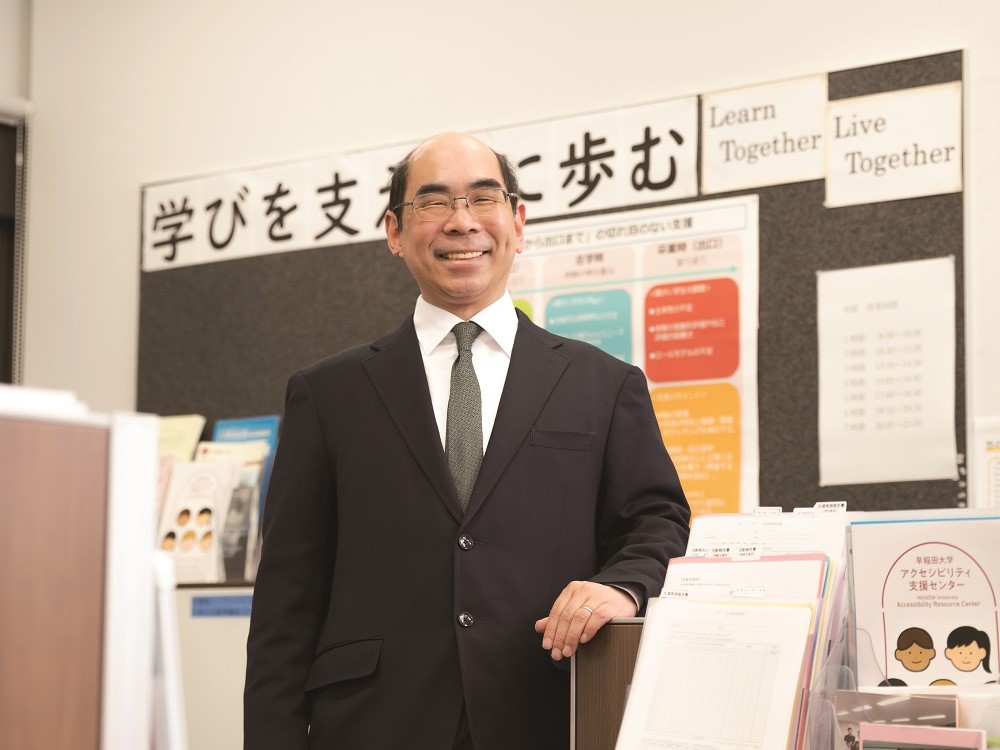Accessibility Resource Center’s Policy for Supporting Students with Disabilities
Tue, Nov 12, 2024-
Tags
The Accessibility Resource Center (ARC) was established in 2023 through a name change. Director of the Student Diversity Center, which oversees the ARC, Takeshi Akiba (Associate Professor, Faculty of International Research and Education), will explain the support policy for students with disabilities.

Utilizing accumulated knowledge to respond to the growing need for reasonable accommodation
Waseda University established the “Disability Student Support Office” in 2006, with specialized staff always on-site to suppor students with disabilities. After undergoing reorganization as the “Office for Students with Disabilities,” the organization’s name was changed to the “Accessibility Resource Center” in December 2023. In addition, the “Basic principles of Waseda University in relation to the support of students with disabilities” was revised to clarify the obligation to provide reasonable accommodation. We view the know-how of supporting students with disabilities that we have accumulated over the years as a strength, and we would like to respond to the growing need for reasonable accommodation.
“Accessibility” means ensuring access to educational opportunities. The English name is “Accessibility Resource Center,” but “resources” refer to information, knowledge, technology, means, etc. We aim to provide equal educational opportunities by creating an environment in which students with disabilities can independently use these resources. At the same time as changing the name to ARC, we also increased our staff. The number of students requiring support has increased dramatically since 2006, and currently there are over 150 students using ARC. We intend to continue strengthening our system so that we can continue to provide sufficient support.
Students with disabilities, student volunteers, and faculty and staff work together to promote accessibility
To provide support to many students with disabilities, the support from student volunteers is also necessary. At Waseda University, students are responsible for much of the on-site support, and a shift system has been established to accommodate diverse needs. Some student volunteers have acquired advanced skills, such as “computer interpreters,” who take turns typing what teachers and students say during class into a computer. Communicating with students with disabilities and being able to think from their perspective is also an opportunity for volunteers to grow.
ARC regularly interviews students with disabilities. Feedback from students is fed back to the faculty/graduate school and relevant departments within the university, creating a system for continually updating systems and facilities.
Sharing information with faculty is also important. When a student applies for reasonable accommodation, the ARC meets with the student and creates a reasonable accommodation proposal while communicating with the student’s faculty/graduate school and the faculty in charge as appropriate.
We also want to focus on making classes universally designed in the future. This will reduce the number of times students have to make individual requests and teachers have to make adjustments, and I think this will also lead to classes that are easier for students without disabilities to participate in.
Providing not just localized support but growth through self-understanding
ARC’s slogan is “Learn Together, Live Together.” It was devised by students who receive support and staff, and it contains two ideas.
The first is “together.” It is not a one-way relationship of “support provider” and “support recipient,” but rather an attitude of moving forward together while deepening mutual understanding. The ARC office on the Waseda campus has an atmosphere where students feel comfortable dropping in, and this type of communication not only builds relationships of trust, but also leads to the discovery of potential issues.
The other is “progress.” It means not only providing individual support, but also encouraging the growth of students with disabilities so that they can help themselves through self-understanding. Students with disabilities who first visit ARC often start with a vague sense of wanting help. However, through repeated dialogue, they come to understand “what kind of support they can receive, and what they can do with the support” and are able to communicate for themselves what support they need and what they don’t need. This independent attitude is also necessary for them to be successful in the real world after graduating from university. We believe that it is the mission of the university as an educational institution to interact with students from a long-term perspective so that they can develop the ability to understand themselves.













